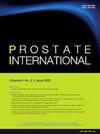Assessing the influence of prostate tissue traits on Gallium-68 prostate-specific membrane-antigen positron-emission tomography/computed tomography: predictive factors for image positivity and locoregional recurrence in prostate cancer patients treated with radical prostatectomy and without prior or salvage treatment
IF 2.6
2区 医学
Q2 UROLOGY & NEPHROLOGY
引用次数: 0
Abstract
Background
Gallium-68 prostate-specific membrane-antigen positron emission tomography/computed tomography (68Ga-PSMA-11 PET/CT) has recently emerged as a novel imaging modality, potentially improving oncologic outcomes for prostate cancer patients. This study aimed to assess the potential predictive factors associated with 68Ga-PSMA-11 PET/CT positivity following persistent prostate-specific antigen (PSA) levels and primary biochemical recurrence post-radical prostatectomy (RP), focusing on prostate specimen characteristics. Furthermore, we aim to identify predictive factors for locoregional recurrence.
Methods
We conducted a retrospective analysis of 230 prostate cancer patients treated with RP and without prior salvage or adjuvant radiotherapy or systemic treatments. All patients underwent 68Ga-PSMA-11 PET/CT scans to detect prostate cancer recurrence detection. Pathological findings were carefully examined and correlated with 68Ga-PSMA-11 PET/CT positivity and locoregional recurrence.
Results
Our analysis showed that 68Ga-PSMA-11 PET/CT positivity was associated with International Society of Urological Pathology (ISUP) grade group ≥3, presence of positive lymph node invasion at the time of RP, positive extra-prostatic extension, involvement of seminal vesicles and post-RP PSA levels ≥0.1 ng/ml. Additionally, we identified ISUP grade group 2 and ISUP grade group ≥3, whether with or without positive lymph node invasion, along with extra-prostatic extension, involvement of seminal vesicles and post-RP PSA ≥0.1 ng/ml were identified as factors associated with pelvic node recurrence.
Conclusion
Pathological findings emerge as robust predictors of 68Ga-PSMA-11 PET/CT positivity and locoregional recurrences in cases of initial biochemical recurrence or persistence without prior adjuvant or salvage treatment. This diagnostic approach facilitates potential adjustments in management strategies, such as PSMA-guided radiotherapy or PSMA-guided lymphadenectomy.
评估前列腺组织特征对镓-68前列腺特异性膜抗原正电子发射断层扫描/计算机断层扫描的影响:接受根治性前列腺切除术且未接受或挽救性治疗的前列腺癌患者图像阳性和局部复发的预测因素
镓-68前列腺特异性膜抗原正电子发射断层扫描/计算机断层扫描(68Ga-PSMA-11 PET/CT)最近成为一种新的成像方式,可能改善前列腺癌患者的肿瘤预后。本研究旨在评估68Ga-PSMA-11 PET/CT阳性与持续性前列腺特异性抗原(PSA)水平和根治性前列腺切除术(RP)后原发性生化复发相关的潜在预测因素,重点关注前列腺标本特征。此外,我们的目标是确定局部复发的预测因素。方法回顾性分析230例RP治疗的前列腺癌患者,这些患者之前没有接受过抢救或辅助放疗或全身治疗。所有患者均行68Ga-PSMA-11 PET/CT扫描检测前列腺癌复发。仔细检查病理结果,并与68Ga-PSMA-11 PET/CT阳性和局部复发相关。结果68Ga-PSMA-11 PET/CT阳性与国际泌尿病理学会(ISUP)分级≥3级、RP时淋巴结浸润阳性、前列腺外延伸阳性、累及精囊、RP后PSA水平≥0.1 ng/ml相关。此外,我们确定ISUP 2级组和ISUP≥3级组,无论是否伴有淋巴结浸润阳性,以及前列腺外延伸、精囊受损伤和rp后PSA≥0.1 ng/ml,都被确定为盆腔淋巴结复发的相关因素。结论病理表现是68Ga-PSMA-11 PET/CT阳性和局部复发的可靠预测因子,在初始生化复发或未进行辅助或挽救治疗的情况下持续存在。这种诊断方法有助于调整治疗策略,如psma引导的放射治疗或psma引导的淋巴结切除术。
本文章由计算机程序翻译,如有差异,请以英文原文为准。
求助全文
约1分钟内获得全文
求助全文
来源期刊

Prostate International
Medicine-Urology
CiteScore
4.40
自引率
26.70%
发文量
40
审稿时长
35 days
期刊介绍:
Prostate International (Prostate Int, PI), the official English-language journal of Asian Pacific Prostate Society (APPS), is an international peer-reviewed academic journal dedicated to basic and clinical studies on prostate cancer, benign prostatic hyperplasia, prostatitis, and ...
 求助内容:
求助内容: 应助结果提醒方式:
应助结果提醒方式:


